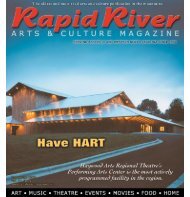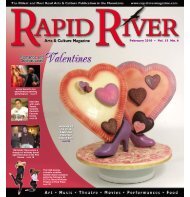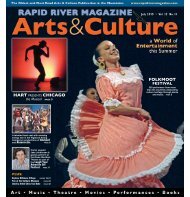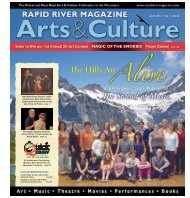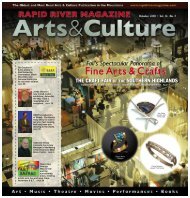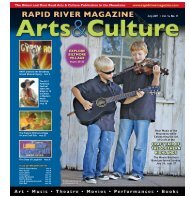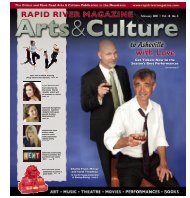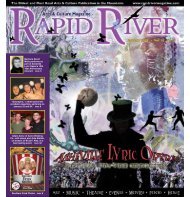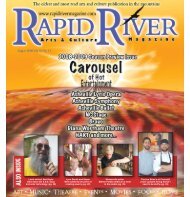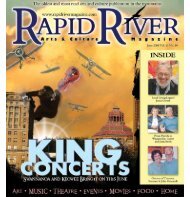JOHN MAC KAH - Rapid River Magazine
JOHN MAC KAH - Rapid River Magazine
JOHN MAC KAH - Rapid River Magazine
Create successful ePaper yourself
Turn your PDF publications into a flip-book with our unique Google optimized e-Paper software.
R A P I D R I V E R A R T S & C U L T U R E M A G A Z I N E<br />
performance<br />
INTERVIEW WITH<br />
Dr. C. Michael Porter<br />
The Asheville Choral Society will<br />
perform its May concert, “From<br />
Tribulation to Celebration: Finding<br />
the Divine through Trial,” on<br />
Saturday, May 21 at 8 p.m. and<br />
Sunday, May 22 at 4 p.m. at Arden Presbyterian<br />
Church.<br />
Under the direction of guest conductor<br />
Dr. C. Michael Porter, the chorus will perform<br />
several works with messages of hope<br />
and strength during times of trial, including<br />
J.S. Bach’s famous cantata, Ein feste Burg ist<br />
unser Gott (A Mighty Fortress Is Our God),<br />
and selected songs both poignant (Blow Ye<br />
the Trumpet) and triumphant (Dan-u-el)<br />
from Kirke Mechem’s opera John Brown.<br />
The “capstone of the concert” will be<br />
Leonard Bernstein’s Chichester Psalms,<br />
one of the most beautiful works of the 20th<br />
century. In it, the listener hears a calling for<br />
peace and “for brethren to dwell together in<br />
unity.” Area soloists Amanda Porter, Mezzosoprano,<br />
Beth Du Roy, Soprano, David<br />
Gresham, Tenor, Phillip Haynie, Baritone,<br />
and Carl Kimbrough, Boy Soprano, will<br />
be featured with the chorus and chamber<br />
orchestra.<br />
Dr. Porter is a familiar presence in the<br />
Asheville music community, as Associate<br />
Conductor and Assistant Music Director of<br />
the Asheville Lyric Opera. He has served as<br />
the Director of Choral Activities and Assistant<br />
Professor of Music at Brevard College<br />
for the past seven years, and has recently<br />
been named the Director of Choral Activities<br />
at Boise State University.<br />
Says Dr. Porter of the May program,<br />
“For hundreds of centuries, humanity has<br />
always expressed itself through song when<br />
pressed to extremes and to lift its spirit.<br />
Whether it was Joshua blowing his trumpet<br />
at the battle of Jericho, prisoners of the<br />
Holocaust reciting the Jewish hymn ‘Hine<br />
ma tov’, or civil rights fighters singing ‘We<br />
shall overcome’, people have always clung to<br />
the power of song to deliver them spiritually<br />
from their oppression. For our May concert,<br />
the ACS will present selections that have a<br />
connection with diverse cultures who found<br />
both solace, and a voice, through song.” Dr.<br />
Porter adds, “You will discover that these<br />
messages still ring true today in our continued<br />
struggle to live in peace.”<br />
<strong>Rapid</strong> <strong>River</strong> <strong>Magazine</strong>: When did you know<br />
that music was going to be your career?<br />
Dr. C. Michael Porter: It probably wasn’t<br />
until my college years that I realized that<br />
I wanted to have a career in music. I was<br />
always attracted to the fine arts during my<br />
early childhood, whether it was playing the<br />
trumpet, singing in choir, or in school plays.<br />
There was something about the creative<br />
process that really fed<br />
my soul. All throughout<br />
my college years<br />
I was greatly influenced<br />
by my music<br />
professors; many of<br />
whom guided me<br />
and supported my<br />
conducting studies.<br />
RRM: What is your<br />
earliest memory of classical music?<br />
CMP: Although I remember the many<br />
tedious hours practicing the piano as a child,<br />
the most meaningful memory of classical<br />
music I have—the one that affected my life<br />
most profoundly—was when my parents<br />
took me to see the movie Amadeus. It was in<br />
the summer of 1984 and I was only 9 years<br />
old. Hearing Mozart’s music in the context<br />
of that heart-wrenching story opened up a<br />
wider world of musical experiences to me.<br />
Of course, I didn’t know this at the time.<br />
All I knew is that afterwards, I wanted to<br />
practice the piano.<br />
RRM: What was your first conducting experience<br />
and how did it go?<br />
CMP: This is one of my favorite questions<br />
to answer. I was in 8th grade and my first<br />
band teacher, Mr. Allen Loesel from Immanuel<br />
Lutheran, asked me to conduct a<br />
piece on our concert. It was a middle school<br />
band medley from the musical Fame!<br />
I practiced my conducting patterns for<br />
weeks. How did it go? As for me, I was too<br />
nervous to hear anything; which could be<br />
a good thing. The idea of a middle school<br />
band playing “I’m gonna live forever…”<br />
still sends me into a panic attack!<br />
For hundreds of centuries,<br />
humanity has expressed<br />
itself through song.<br />
Guest conductor for the Asheville<br />
Choral Society, Dr. C. Michael Porter<br />
RRM: If you could put one piece of music<br />
from 1900 to today into a time capsule for<br />
future generations which one would it be?<br />
CMP: I would have to say Leonard Bernstein’s<br />
Chichester Psalms, which we will<br />
be performing on our concert. What I find<br />
most interesting with this work is that it<br />
represents the struggles, both musically and<br />
socially, that humanity experienced during<br />
the 20th century. Musically, Bernstein uses<br />
contemporary musical styles—such as those<br />
favored by modern concert composers—<br />
alongside traditional styles (even using hints<br />
of the American Musical Theatre sounds).<br />
It is a hodgepodge of musical develop-<br />
INTERVIEWED BY DENNIS RAY<br />
ments from this era. More<br />
importantly is its universal<br />
call for peace. In the second<br />
movement, Bernstein<br />
quotes the beginning of<br />
Psalm 2 from the Old Testament<br />
(“Why do the nations<br />
rage…”) with aggressive,<br />
dissonant sounds, only to be<br />
answered in the third movement<br />
with Psalm 133 (“Behold<br />
how good and pleasant<br />
it is for brothers to dwell<br />
together.”) with a lyrical, heartfelt melody.<br />
If future generations have not learned to<br />
coexist as one global family, then I hope that<br />
finding this work in a time capsule would<br />
remind them of their commitment to each<br />
other.<br />
RRM: What are some of your favorite pieces<br />
you will be presenting on May 21 and 22?<br />
CMP: All of them, of course! My musical<br />
taste is pretty extensive; I enjoy a Renaissance<br />
motet just as much as an Appalachian<br />
folk song. I hope people walk away from<br />
our concert appreciating this eclectic, yet<br />
cohesive array of music. That being said,<br />
I am always partial to anything by Bach.<br />
I had the privilege of studying with the<br />
celebrated conductor and Bach interpreter<br />
Helmut Rilling at the 2008 Oregon Bach<br />
Festival. At this festival, Rilling helped illuminate<br />
the immense craftsmanship and<br />
spirituality found in every note Bach wrote.<br />
Because of this, I am forever in awe of the<br />
musical monuments composed by this<br />
Baroque genius.<br />
RRM: A chorus is a massive, coherent body<br />
of musicians as well as a group of individuals.<br />
How do you take both into account?<br />
CMP: While a chorus is a group that can<br />
accomplish goals that a single musician can<br />
not, its identity and personality is made up<br />
of each individual involved. I find it thrilling<br />
to work with groups where the personnel<br />
is different within its ranks; where the<br />
singers bring a wide variety of personalities<br />
to each rehearsal. What is most interesting<br />
is that despite this variety, each member is<br />
committed to being a single mind—a single<br />
voice—in their performances. It is my job<br />
to achieve this unity without loosing the<br />
individuality of each singer.<br />
RRM: From your experience, is working<br />
on light-hearted productions possibly even<br />
more difficult than on “serious” works like<br />
Wagner-operas?<br />
CMP: Absolutely. This question reminds<br />
me of when my actor friends say that<br />
comedy is more difficult than drama. I<br />
have found that both the serious and lighthearted<br />
productions are equally difficult.<br />
However, it is the light-hearted works that<br />
are deceptively difficult. If we approach a<br />
lighter work with less devotion than a serious<br />
work, then we fail at communicating<br />
the composer’s humorous intentions. And<br />
there is nothing worse than comedy that<br />
falls flat! We owe our audience the same<br />
amount of preparation and energy regardless<br />
of the subject matter.<br />
RRM: What, from your perspective, is the<br />
thing most people get wrong about conducting?<br />
CMP: There are just as many ways to “conduct”<br />
as there are conductors. That being<br />
said, a good conductor is one who puts the<br />
ensemble and the musical score before his<br />
or herself. Sometimes I think people are<br />
wowed by the “show” and “dance” of a<br />
conductor during a concert rather than the<br />
group’s performance. A conductor’s gesture<br />
must be used to communicate to the ensemble<br />
musical meaning, not be a diversion<br />
from the performance. I want an audience<br />
to pay attention to the score and the choir,<br />
not me. Some of the most influential and<br />
inspiring conductors I’ve known have been<br />
the most humble people I’ve worked with;<br />
musicians who understand that the musical<br />
performance is not about themselves but<br />
about the musicians and the score. Conductors<br />
are really servants to the people making<br />
music and the composers who left us such<br />
wonderful works of art.<br />
RRM: What is your advice to aspiring musicians<br />
and singers?<br />
CMP: The love of our craft, the passion for<br />
creating art is paramount. You must have<br />
a burning desire to better yourself at all<br />
times. Moreover, be humble and always<br />
support your colleagues. Know that you can<br />
learn something from everyone at any given<br />
time. This will make you successful and,<br />
most importantly, a better person. Finally,<br />
always be an advocate for the arts! As the<br />
late Robert Shaw, conductor of the Atlanta<br />
Symphony Orchestra and Chorus, said,<br />
“The arts are not a luxury of the few, but<br />
the necessity of the many.”<br />
IF<br />
YOU<br />
GO<br />
From Tribulation to Celebration:<br />
Finding the Divine through Trial<br />
is the third and final concert in the<br />
Asheville Choral Society’s 34th season,<br />
“Good Things Come in Threes,” with<br />
each concert featuring a different guest<br />
conductor. The May 21-22 concert also<br />
features a new venue: Arden Presbyterian<br />
Church, 2215 Hendersonville Road, Arden.<br />
Tickets can be purchased at the door or<br />
from the Asheville Choral Society via its<br />
website at www.ashevillechoralsociety.org,<br />
by calling (828) 232-2060, or at the door.<br />
Special discounts are available for groups of<br />
10 or more.<br />
Vol. 14, No. 9 — RAPID RIVER ARTS & CULTURE MAGAZINE — May 2011 13



